国培计划初中英语培训班课程
- 格式:doc
- 大小:198.00 KB
- 文档页数:3
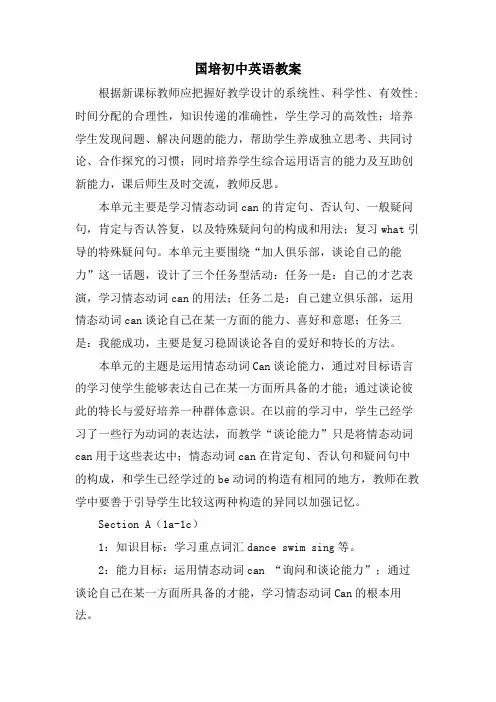
国培初中英语教案根据新课标教师应把握好教学设计的系统性、科学性、有效性;时间分配的合理性,知识传递的准确性,学生学习的高效性;培养学生发现问题、解决问题的能力,帮助学生养成独立思考、共同讨论、合作探究的习惯;同时培养学生综合运用语言的能力及互助创新能力,课后师生及时交流,教师反思。
本单元主要是学习情态动词can的肯定句、否认句、一般疑问句,肯定与否认答复,以及特殊疑问句的构成和用法;复习what引导的特殊疑问句。
本单元主要围绕“加人俱乐部,谈论自己的能力”这一话题,设计了三个任务型活动:任务一是:自己的才艺表演,学习情态动词can的用法;任务二是:自己建立俱乐部,运用情态动词can谈论自己在某一方面的能力、喜好和意愿;任务三是:我能成功,主要是复习稳固谈论各自的爱好和特长的方法。
本单元的主题是运用情态动词Can谈论能力,通过对目标语言的学习使学生能够表达自己在某一方面所具备的才能;通过谈论彼此的特长与爱好培养一种群体意识。
在以前的学习中,学生已经学习了一些行为动词的表达法,而教学“谈论能力”只是将情态动词can用于这些表达中;情态动词can在肯定旬、否认句和疑问句中的构成,和学生已经学过的be动词的构造有相同的地方,教师在教学中要善于引导学生比较这两种构造的异同以加强记忆。
Section A(1a-1c)1:知识目标:学习重点词汇dance swim sing等。
2:能力目标:运用情态动词can “询问和谈论能力”;通过谈论自己在某一方面所具备的才能,学习情态动词Can的根本用法。
3:情感态度价值观:Section A的学习内容贴近学生的生活,谈论的话题是能力。
通过互相询问或谈论自己或对方在某一方面的能力,可以培养学生的一种群体意识。
采用Classifying和Role—playing的学习策略,利用教学图片、幻灯片、实物(各种乐器)或制作课件(演奏各种乐器)等来展开课堂教学、Pairwork问答式的口语交际活动或小组活动,进展“询问和谈论能力”的课堂教学和练习、重点:学习并掌握重点词汇;学习询问和谈论彼此的能力和特长。
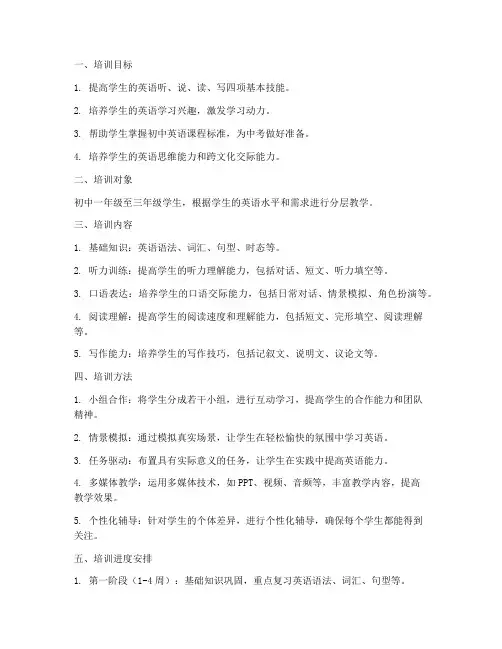
一、培训目标1. 提高学生的英语听、说、读、写四项基本技能。
2. 培养学生的英语学习兴趣,激发学习动力。
3. 帮助学生掌握初中英语课程标准,为中考做好准备。
4. 培养学生的英语思维能力和跨文化交际能力。
二、培训对象初中一年级至三年级学生,根据学生的英语水平和需求进行分层教学。
三、培训内容1. 基础知识:英语语法、词汇、句型、时态等。
2. 听力训练:提高学生的听力理解能力,包括对话、短文、听力填空等。
3. 口语表达:培养学生的口语交际能力,包括日常对话、情景模拟、角色扮演等。
4. 阅读理解:提高学生的阅读速度和理解能力,包括短文、完形填空、阅读理解等。
5. 写作能力:培养学生的写作技巧,包括记叙文、说明文、议论文等。
四、培训方法1. 小组合作:将学生分成若干小组,进行互动学习,提高学生的合作能力和团队精神。
2. 情景模拟:通过模拟真实场景,让学生在轻松愉快的氛围中学习英语。
3. 任务驱动:布置具有实际意义的任务,让学生在实践中提高英语能力。
4. 多媒体教学:运用多媒体技术,如PPT、视频、音频等,丰富教学内容,提高教学效果。
5. 个性化辅导:针对学生的个体差异,进行个性化辅导,确保每个学生都能得到关注。
五、培训进度安排1. 第一阶段(1-4周):基础知识巩固,重点复习英语语法、词汇、句型等。
2. 第二阶段(5-8周):听力训练,提高学生的听力理解能力。
3. 第三阶段(9-12周):口语表达训练,培养学生的口语交际能力。
4. 第四阶段(13-16周):阅读理解训练,提高学生的阅读速度和理解能力。
5. 第五阶段(17-20周):写作能力训练,培养学生的写作技巧。
6. 第六阶段(21-24周):综合复习,为中考做好准备。
六、培训评估1. 定期进行口语、听力、阅读、写作等方面的测试,评估学生的学习成果。
2. 对学生的课堂表现、作业完成情况进行综合评价。
3. 家长反馈:定期与家长沟通,了解学生的学习情况和进步,共同促进学生的成长。
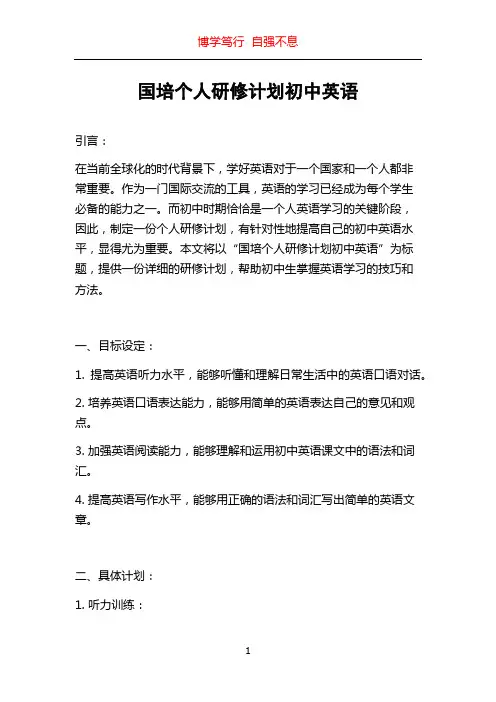
国培个人研修计划初中英语引言:在当前全球化的时代背景下,学好英语对于一个国家和一个人都非常重要。
作为一门国际交流的工具,英语的学习已经成为每个学生必备的能力之一。
而初中时期恰恰是一个人英语学习的关键阶段,因此,制定一份个人研修计划,有针对性地提高自己的初中英语水平,显得尤为重要。
本文将以“国培个人研修计划初中英语”为标题,提供一份详细的研修计划,帮助初中生掌握英语学习的技巧和方法。
一、目标设定:1. 提高英语听力水平,能够听懂和理解日常生活中的英语口语对话。
2. 培养英语口语表达能力,能够用简单的英语表达自己的意见和观点。
3. 加强英语阅读能力,能够理解和运用初中英语课文中的语法和词汇。
4. 提高英语写作水平,能够用正确的语法和词汇写出简单的英语文章。
二、具体计划:1. 听力训练:a. 每天听英语音频,例如英语新闻、英语电影或英语歌曲,并跟读。
b. 利用网络资源,如英语学习网站或手机应用程序,选择合适自己水平的听力材料进行训练。
c. 参加英语角、英语演讲比赛或其他英语活动,与他人进行英语口语交流。
2. 口语表达训练:a. 在每天的英语学习中,积极参与课堂讨论,勇于表达自己的观点。
b. 利用口语学习软件或应用,进行英语口语对话练习。
c. 找到一个英语学习伙伴,互相练习日常对话。
3. 阅读训练:a. 阅读英语课本和英语故事书,提高阅读理解能力。
b. 利用网络资源,如新闻网站、杂志或小说等,阅读各类英语文章。
c. 定期写读后感或思考问题,加深对文章内容的理解。
4. 写作训练:a. 每天进行简单的英语写作训练,如写日记、写信或写短文。
b. 逐步提高写作难度,从简单的句子开始,逐渐引入更复杂的语法和词汇。
c. 寻找写作指导和反馈,如老师或其他英语学习者,对自己的英语写作进行修正和改进。
三、注意事项:1. 坚持每天学习英语,尽量保持连续性,形成良好的学习习惯。
2. 确保学习内容与自己的学习能力相匹配,既不过于简单,也不过于困难。
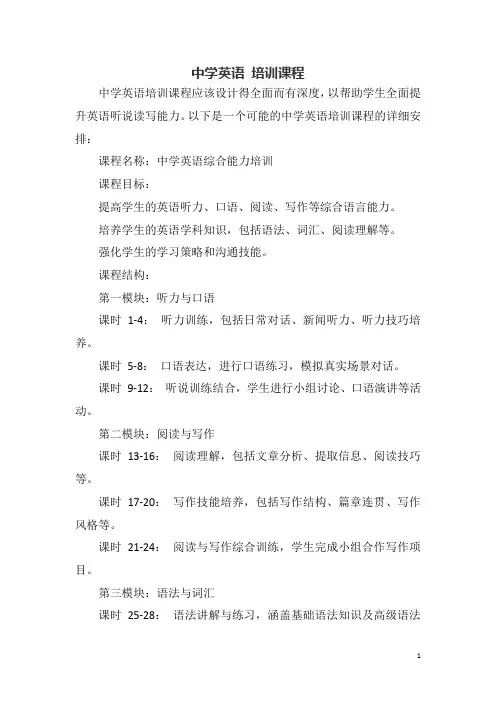
中学英语培训课程中学英语培训课程应该设计得全面而有深度,以帮助学生全面提升英语听说读写能力。
以下是一个可能的中学英语培训课程的详细安排:课程名称:中学英语综合能力培训课程目标:提高学生的英语听力、口语、阅读、写作等综合语言能力。
培养学生的英语学科知识,包括语法、词汇、阅读理解等。
强化学生的学习策略和沟通技能。
课程结构:第一模块:听力与口语课时1-4:听力训练,包括日常对话、新闻听力、听力技巧培养。
课时5-8:口语表达,进行口语练习,模拟真实场景对话。
课时9-12:听说训练结合,学生进行小组讨论、口语演讲等活动。
第二模块:阅读与写作课时13-16:阅读理解,包括文章分析、提取信息、阅读技巧等。
课时17-20:写作技能培养,包括写作结构、篇章连贯、写作风格等。
课时21-24:阅读与写作综合训练,学生完成小组合作写作项目。
第三模块:语法与词汇课时25-28:语法讲解与练习,涵盖基础语法知识及高级语法结构。
课时29-32:词汇积累,通过词汇表、词根词缀等方式进行词汇扩展。
课时33-36:语法与词汇综合应用,学生通过阅读、写作等综合运用。
第四模块:学习策略与文化交流课时37-40:学习策略,引导学生制定学习计划、提高学习效率。
课时41-44:跨文化交际,学生通过文化差异的讨论,提高跨文化交际能力。
课时45-48:课程总结与个人发展规划,学生制定未来学习英语的计划。
教学方法:互动式教学:利用小组活动、角色扮演等方式,增强学生的互动和合作意识。
项目式学习:鼓励学生通过项目学习,提高实际运用英语的能力。
多媒体教学:利用音频、视频等多媒体资源,激发学生学习兴趣。
实践活动:安排实地考察、英语角、模拟面试等实践活动,提高学生实际运用的机会。
评估与考核:平时表现:包括课堂参与、作业完成情况、小组项目表现等。
阶段测验:每个模块结束后进行的小测验,考察学生对该模块知识的掌握程度。
期末考核:综合考察学生在听说读写各方面的能力,通过笔试、口试、项目展示等方式。
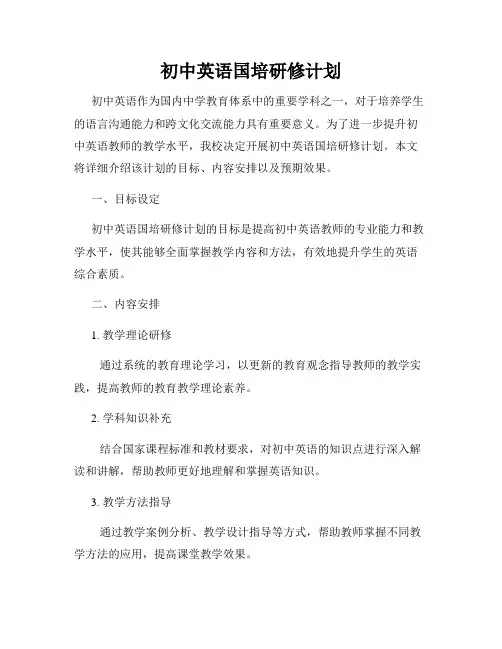
初中英语国培研修计划初中英语作为国内中学教育体系中的重要学科之一,对于培养学生的语言沟通能力和跨文化交流能力具有重要意义。
为了进一步提升初中英语教师的教学水平,我校决定开展初中英语国培研修计划。
本文将详细介绍该计划的目标、内容安排以及预期效果。
一、目标设定初中英语国培研修计划的目标是提高初中英语教师的专业能力和教学水平,使其能够全面掌握教学内容和方法,有效地提升学生的英语综合素质。
二、内容安排1. 教学理论研修通过系统的教育理论学习,以更新的教育观念指导教师的教学实践,提高教师的教育教学理论素养。
2. 学科知识补充结合国家课程标准和教材要求,对初中英语的知识点进行深入解读和讲解,帮助教师更好地理解和掌握英语知识。
3. 教学方法指导通过教学案例分析、教学设计指导等方式,帮助教师掌握不同教学方法的应用,提高课堂教学效果。
4. 资源分享和教学工具的使用分享各类英语学习资源和教学辅助工具,帮助教师更好地准备和展开课堂教学,提高学生学习的积极性和效果。
三、预期效果1. 教师专业素养的提高通过系统的培训和学习,教师将提高对教学理论的理解和应用能力,增强教学技能和方法的熟练程度。
2. 学生英语综合素质的提升优质的教师资源和教学方法的运用将有效提升学生的英语学习效果和综合素质。
3. 教师教学积极性的增强通过培训和学习,教师将获得更多的教学资源和教学方法,从而增强他们的教学信心和积极性。
结语初中英语国培研修计划的开展将为我校的英语教学工作注入新的活力和动力。
我们相信,通过这一计划,预计会提高教师的专业能力和教学水平,为学生的英语学习和培养打下坚实的基础。
在今后的教学工作中,我们将持续关注和推进初中英语教育的进步和创新,为学生的英语学习创造更好的环境和机会。
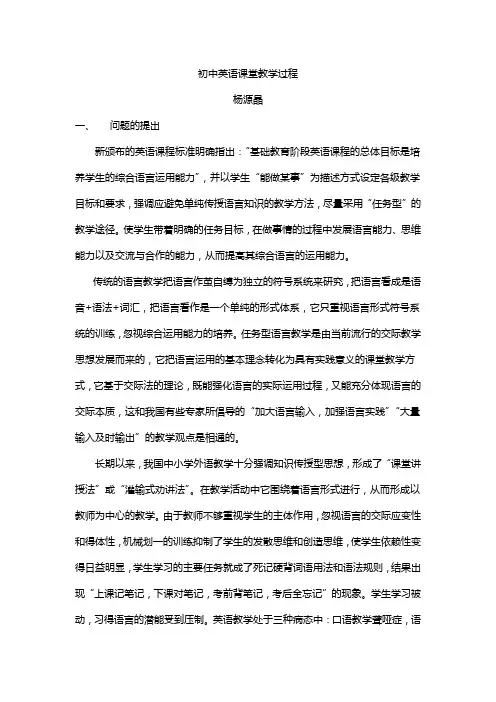
初中英语课堂教学过程杨源晶一、问题的提出新颁布的英语课程标准明确指出:‚基础教育阶段英语课程的总体目标是培养学生的综合语言运用能力‛,并以学生‚能做某事‛为描述方式设定各级教学目标和要求,强调应避免单纯传授语言知识的教学方法,尽量采用‚任务型‛的教学途径。
使学生带着明确的任务目标,在做事情的过程中发展语言能力、思维能力以及交流与合作的能力,从而提高其综合语言的运用能力。
传统的语言教学把语言作茧自缚为独立的符号系统来研究,把语言看成是语音+语法+词汇,把语言看作是一个单纯的形式体系,它只重视语言形式符号系统的训练,忽视综合运用能力的培养。
任务型语言教学是由当前流行的交际教学思想发展而来的,它把语言运用的基本理念转化为具有实践意义的课堂教学方式,它基于交际法的理论,既能强化语言的实际运用过程,又能充分体现语言的交际本质,这和我国有些专家所倡导的‚加大语言输入,加强语言实践‛‚大量输入及时输出‛的教学观点是相通的。
长期以来,我国中小学外语教学十分强调知识传授型思想,形成了‚课堂讲授法‛或‚灌输式劝讲法‛。
在教学活动中它围绕着语言形式进行,从而形成以教师为中心的教学。
由于教师不够重视学生的主体作用,忽视语言的交际应变性和得体性,机械划一的训练抑制了学生的发散思维和创造思维,使学生依赖性变得日益明显,学生学习的主要任务就成了死记硬背词语用法和语法规则,结果出现‚上课记笔记,下课对笔记,考前背笔记,考后全忘记‛的现象。
学生学习被动,习得语言的潜能受到压制。
英语教学处于三种病态中:口语教学聋哑症,语法教学高血压,课文教学贫血症。
语言交际功能完全失效。
为此,语言专家提出‚让学生通过语言使用(即用英语进行各种活动)来掌握语言,使学生在活动中不知不觉学到语言,并在完成任务的过程中发挥他们的创造性‛。
2002年秋,我校与另一间学校合并,依傍两间学校的优势,借课改的东风,我们把任务型教学的理论应用于教学实际中,英语组课题《中学英语‚任务型‛教学研究》,获区十五规划课题立项。
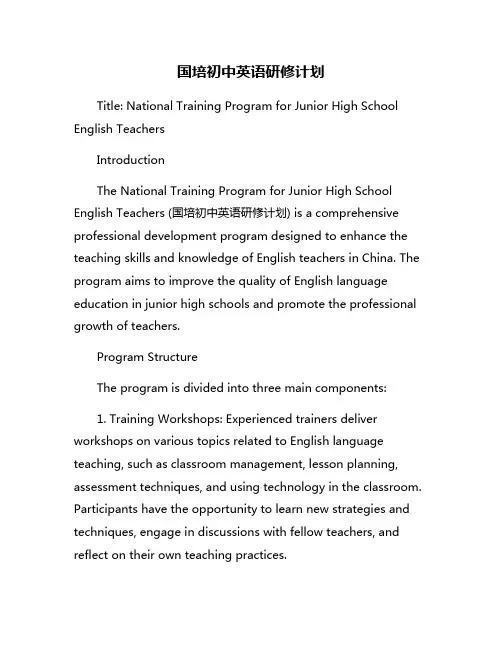
国培初中英语研修计划Title: National Training Program for Junior High School English TeachersIntroductionThe National Training Program for Junior High School English Teachers (国培初中英语研修计划) is a comprehensive professional development program designed to enhance the teaching skills and knowledge of English teachers in China. The program aims to improve the quality of English language education in junior high schools and promote the professional growth of teachers.Program StructureThe program is divided into three main components:1. Training Workshops: Experienced trainers deliver workshops on various topics related to English language teaching, such as classroom management, lesson planning, assessment techniques, and using technology in the classroom. Participants have the opportunity to learn new strategies and techniques, engage in discussions with fellow teachers, and reflect on their own teaching practices.2. Classroom Observations: Participants have the opportunity to observe experienced teachers in action in real classroom settings. This hands-on experience allows teachers to see successful teaching strategies in practice and provides valuable insights into effective teaching methods.3. Reflective Practice: Teachers are encouraged to reflect on their own teaching practices and identify areas for improvement. They are supported by mentors who provide guidance and feedback on their teaching, helping them to develop their skills and become more effective educators.Benefits of the ProgramParticipating in the National Training Program for Junior High School English Teachers offers a number of benefits for teachers, schools, and students:1. Enhanced Teaching Skills: Teachers gain new knowledge and skills that can help them become more effective educators. They learn innovative teaching strategies and techniques that can enhance student learning outcomes.2. Professional Growth: The program provides opportunities for teachers to reflect on their teaching practices, receive feedback from mentors, and engage in professionaldevelopment activities. This helps teachers to grow and improve their teaching skills over time.3. Improved Student Learning: By enhancing the teaching skills and knowledge of English teachers, the program ultimately benefits students. Students receive high-quality English language instruction that can help them improve their language proficiency and academic performance.4. Networking Opportunities: The program brings together English teachers from across the country, providing opportunities for networking, collaboration, and sharing of best practices. Teachers can learn from each other, exchange ideas, and build a professional support network.ConclusionThe National Training Program for Junior High School English Teachers is a valuable professional development program that aims to enhance the quality of English language education in China. By providing teachers with training, support, and networking opportunities, the program helps to improve teaching skills, promote professional growth, and ultimately benefit students. Participating in the program can have a positive impact on teachers, schools, and the overall quality of English language education in China.。
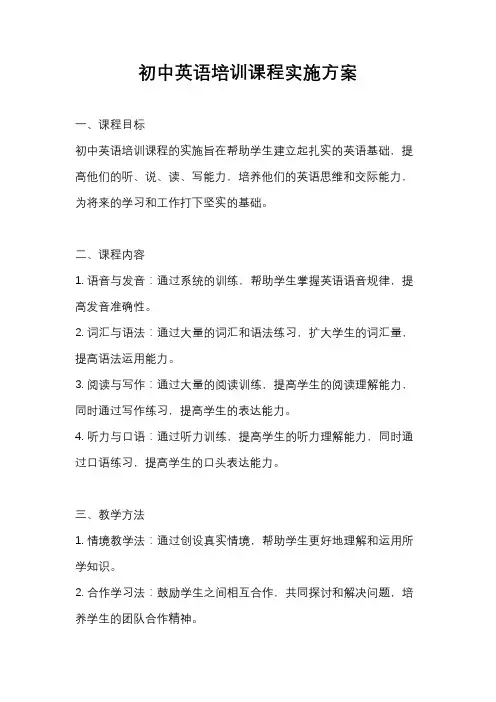
初中英语培训课程实施方案一、课程目标初中英语培训课程的实施旨在帮助学生建立起扎实的英语基础,提高他们的听、说、读、写能力,培养他们的英语思维和交际能力,为将来的学习和工作打下坚实的基础。
二、课程内容1. 语音与发音:通过系统的训练,帮助学生掌握英语语音规律,提高发音准确性。
2. 词汇与语法:通过大量的词汇和语法练习,扩大学生的词汇量,提高语法运用能力。
3. 阅读与写作:通过大量的阅读训练,提高学生的阅读理解能力,同时通过写作练习,提高学生的表达能力。
4. 听力与口语:通过听力训练,提高学生的听力理解能力,同时通过口语练习,提高学生的口头表达能力。
三、教学方法1. 情境教学法:通过创设真实情境,帮助学生更好地理解和运用所学知识。
2. 合作学习法:鼓励学生之间相互合作,共同探讨和解决问题,培养学生的团队合作精神。
3. 多媒体教学法:结合多媒体技术,丰富教学内容,提高学生的学习兴趣和参与度。
四、教学手段1. 课堂教学:通过老师的讲解和学生的互动,帮助学生掌握知识点。
2. 课外作业:布置适量的课外作业,巩固学生所学内容,培养学生的自主学习能力。
3. 教学实践:组织学生进行实践活动,如英语角、英语演讲比赛等,提高学生的实际运用能力。
五、评价方式1. 学业考核:定期组织考试,评估学生的学习情况,及时发现问题并加以解决。
2. 课堂表现:评价学生在课堂上的表现,包括听力、口语、互动等方面。
3. 作业质量:评价学生的课外作业完成情况,包括书面作业和口头作业。
六、课程管理1. 教学计划:制定详细的教学计划,包括每周教学内容、教学方法、教学手段等。
2. 教材选择:选择适合学生年龄和水平的教材,保证教学质量。
3. 师资配备:配备优秀的英语教师,提高教学质量。
七、课程改进定期对课程进行评估,收集学生和教师的意见和建议,及时调整课程内容和教学方法,不断提高课程质量。
通过以上实施方案,我们相信初中英语培训课程能够有效地提高学生的英语水平,为他们的学习和未来的发展打下坚实的基础。
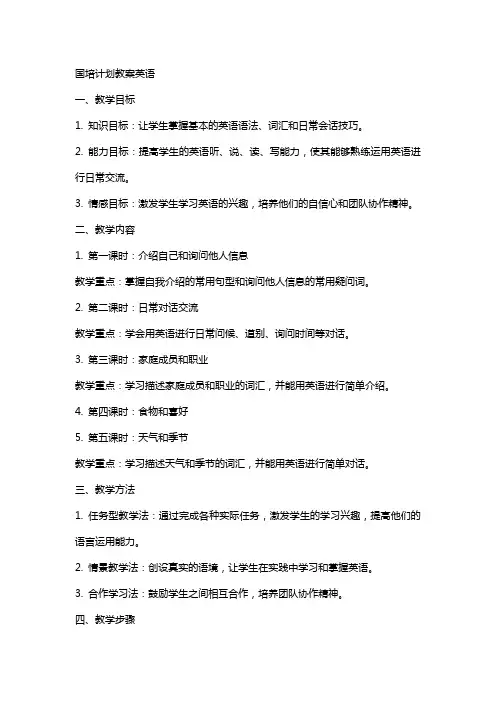
国培计划教案英语一、教学目标1. 知识目标:让学生掌握基本的英语语法、词汇和日常会话技巧。
2. 能力目标:提高学生的英语听、说、读、写能力,使其能够熟练运用英语进行日常交流。
3. 情感目标:激发学生学习英语的兴趣,培养他们的自信心和团队协作精神。
二、教学内容1. 第一课时:介绍自己和询问他人信息教学重点:掌握自我介绍的常用句型和询问他人信息的常用疑问词。
2. 第二课时:日常对话交流教学重点:学会用英语进行日常问候、道别、询问时间等对话。
3. 第三课时:家庭成员和职业教学重点:学习描述家庭成员和职业的词汇,并能用英语进行简单介绍。
4. 第四课时:食物和喜好5. 第五课时:天气和季节教学重点:学习描述天气和季节的词汇,并能用英语进行简单对话。
三、教学方法1. 任务型教学法:通过完成各种实际任务,激发学生的学习兴趣,提高他们的语言运用能力。
2. 情景教学法:创设真实的语境,让学生在实践中学习和掌握英语。
3. 合作学习法:鼓励学生之间相互合作,培养团队协作精神。
四、教学步骤1. 热身活动:引导学生用中文进行自我介绍,用英语进行翻译,熟悉新环境。
2. 课堂导入:用英语介绍本节课的主题,激发学生的学习兴趣。
3. 新课内容:讲解本节课的重点词汇和句型,并通过示例进行演示。
4. 实践环节:让学生在小组内进行角色扮演,运用所学词汇和句型进行对话。
5. 巩固环节:组织课堂游戏或竞赛,让学生在游戏中运用所学知识。
7. 课后作业:布置相关的练习题,巩固所学知识。
五、教学评价1. 过程性评价:观察学生在课堂活动中的参与程度、语言运用能力和团队协作精神。
2. 终结性评价:通过课后作业和测验,评估学生对所学知识的掌握程度。
3. 自我评价:鼓励学生对自己的学习进行反思,提出改进措施。
六、教学策略1. 交互式教学:通过提问、讨论等方式,让学生积极参与课堂,提高他们的思维能力和语言表达能力。
2. 情境模拟:创造真实的语境,让学生在模拟生活中运用英语,提高他们的实际应用能力。

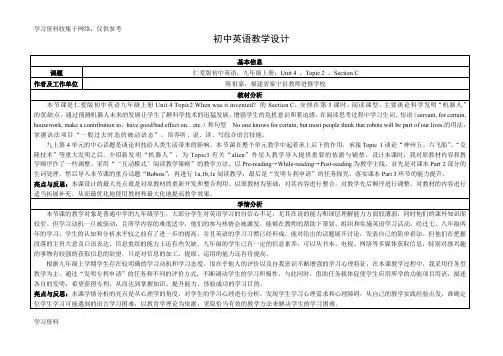
初中英语教师国培研修计划在全球化的浪潮中,英语作为国际交流的重要工具,其教育的重要性日益凸显。
初中阶段作为学生英语学习的关键期,教师的引导作用不可或缺。
为了提升初中英语教师的教学水平和专业能力,国家启动了国培计划,致力于打造一支高素质的英语教师队伍。
以下是一份典型的初中英语教师国培研修计划范本,它涵盖了从理论学习到实践操作的全方位培训内容。
理论学习是提升教师内涵的基础。
研修计划中包含了现代教育理念、英语教学法、课程标准解读等多个模块。
通过对这些理论知识的学习,教师能够更好地理解教育的本质,把握教学的方向。
例如,教师将深入学习任务型教学法,了解如何设计以学生为中心的课堂活动,激发学生的学习兴趣和主动性。
教学技能的提升是研修的重点之一。
研修计划中特别强调了多媒体教学技术的应用、课堂管理技巧以及评价方法的创新。
在这个环节中,教师将通过实际操作,掌握利用电子白板、T等工具进行高效教学的方法。
同时,通过模拟课堂和案例分析,教师能够学会如何有效地管理多元化的班级,确保每个学生都能在课堂上得到充分的关注和发展。
文化交流与国际视野的拓展也是研修计划的一大亮点。
鉴于英语是一门语言工具,它的学习离不开文化的熏陶。
因此,研修计划中设置了英语国家文化、跨文化交际等课程,帮助教师拓宽国际视野,增强跨文化交际能力。
这不仅能让教师在教学中更好地融入文化元素,还能引导学生形成正确的世界观和价值观。
实践操作是检验学习成果的关键。
研修计划鼓励教师将所学知识应用到实际教学中去,进行教学设计和实践尝试。
在这个过程中,教师将面临真实的教学场景,需要综合运用各种教学策略和技能,以达到最佳的教学效果。
通过这种实践,教师能够不断地反思和优化自己的教学方法,实现自我提升。
初中英语教师研修国培计划一、培训目标本次国培计划的核心目标是提升初中英语教师的教学技能和专业知识,增强他们的课堂教学互动能力,以及运用现代教育技术的能力。
通过系统的培训,使教师能够更好地适应新时代教育发展的需求,培养出更多具有国际视野和创新能力的学生。
二、培训内容2.1 教学法更新培训将涵盖最新的英语教学法,如任务型教学、情景教学等,帮助教师了解如何将理论应用于实际教学中,提高课堂效率和学生参与度。
2.2 课程与教材研究深入分析现行教材,探讨如何更有效地利用教材资源,以及如何根据学生实际情况进行适当的教材拓展和创新。
2.3 评价方法改革传统的考试评价方式逐渐向多元化评价转变,培训将教授如何运用形成性评价和终结性评价相结合的方式,全面评估学生的学习成果。
2.4 信息技术应用随着信息技术的发展,教师需要掌握多媒体教学工具的使用,以及网络资源的整合能力,使得教学更加生动和高效。
三、培训形式3.1 线上与线下结合采用线上学习和线下研讨相结合的方式,确保教师能够在灵活的时间内完成学习任务,同时也能够通过面对面的交流深化理解和实践。
3.2 案例分析与实操通过具体的教学案例分析,让教师们学会如何在实际教学中解决问题,并通过模拟教学等方式进行实操训练。
3.3 名师引领与同行互助邀请有经验的英语教学名师进行讲座和示范课,同时鼓励教师之间的交流与合作,共同进步。
四、培训效果评估为了保证培训效果,将设立严格的评估体系,包括教师自我评价、同行评价、学生反馈以及专家考核等多个维度,确保培训质量。
五、后续支持与发展培训结束后,将建立持续的支持系统,包括在线资源库的访问、定期的教研活动以及进阶培训机会等,以确保教师能够持续成长。
初中英语国培计划代表课教学实录及观察材料全文共3篇示例,供读者参考篇1Observation Report on Representative Class Teaching of Junior High School English National Training PlanIntroductionThe Junior High School English National Training Plan aims to improve the English teaching skills of junior high school teachers across the country. As a representative class, I observed a teacher conducting a lesson on vocabulary building and reading comprehension. This report will provide a detailed analysis of the lesson.Lesson ObjectivesThe lesson focused on helping students expand their vocabulary and improve their reading comprehension skills. The main objectives were for students to learn and use new words in context, and to understand the main ideas and details from a text.Lesson StructureThe lesson was well-structured and comprised of three main phases: pre-reading, reading, and post-reading activities. During the pre-reading phase, the teacher introduced new vocabulary words related to the text and engaged the students in a discussion about the topic. The reading phase involved students reading the text individually and in pairs, while the teacher provided guidance and support as needed. In the post-reading phase, students answered comprehension questions and participated in a class discussion to share their understanding of the text.Teaching StrategiesThe teacher used a variety of teaching strategies to engage students and facilitate their learning. These included using visuals and realia to introduce new vocabulary, guiding students through the process of reading and understanding the text, and encouraging students to participate actively in the lesson through group discussions and sharing ideas.Classroom ManagementThe teacher demonstrated effective classroom management skills by creating a positive and supportive learning environment. She maintained good rapport with the students, managed transitions smoothly between different activities, and providedclear instructions for tasks. The teacher also managed to keep the students motivated and engaged throughout the lesson.Assessment and FeedbackAssessment and feedback were an integral part of the lesson. The teacher conducted formative assessments during the lesson to monitor students' progress and understanding. She provided feedback on students' responses and encouraged them to improve their answers. At the end of the lesson, the teacher also gave constructive feedback on students' performance and areas for improvement.ConclusionOverall, the representative class was successful in achieving its objectives of improving students' vocabulary and reading comprehension skills. The teacher demonstrated effective teaching strategies, classroom management skills, and assessment practices. The students were actively engaged in the lesson and showed good progress in their learning. The lesson was a valuable learning experience for both the students and the observer, and it highlighted the importance of quality teaching practices in the Junior High School English National Training Plan.篇2Observation on Junior High School English National Training Program Representative Class Teaching and MaterialsIntroductionThe Junior High School English National Training Program is a significant initiative in Chinese education aimed at improving the English language teaching proficiency of teachers through intensive training sessions. As part of this program, representative classes are conducted to showcase effective teaching methods and materials. In this report, I will share my observation of a representative class and discuss the teaching strategies and materials used.ObservationThe representative class I observed was a Grade 9 English class on the topic of environmental protection. The teacher started the class by eliciting students' prior knowledge on the topic through a brainstorming session. This was followed by a reading comprehension activity where students read a passage about the importance of protecting the environment. The teacher then facilitated a discussion on the main ideas and asked students to summarize the key points.Next, the teacher introduced a vocabulary building activity using flashcards. The students were encouraged to practice pronunciation and usage of the new words through interactive games. This was followed by a grammar exercise focusing on different types of verbs used to discuss environmental issues, such as 'pollute', 'protect', and 'conserve'.The class then moved on to a group work task where students were assigned roles to prepare a short skit on a given environmental scenario. The teacher provided guidance and feedback during the preparation phase, emphasizing the importance of using the vocabulary and grammar structures studied earlier in the lesson.Finally, the students performed their skits in front of the class, and the teacher led a reflection session where students discussed what they had learned from the activity. The teacher then summarized the key points of the lesson and assigned homework to reinforce the concepts learned.Teaching StrategiesThe teaching strategies used in the representative class were highly effective in engaging students and promoting active learning. The teacher employed a variety of activities, such as brainstorming, reading comprehension, vocabulary building,grammar exercises, and group work, to cater to different learning styles and abilities. The use of interactive games and role plays also made the lesson more dynamic and engaging.The teacher demonstrated excellent classroom management skills by setting clear expectations, providing timely feedback, and encouraging participation from all students. The lesson was well-paced, with a good balance between teacher-led instruction and student-centered activities. The teacher also incorporated real-life examples and scenarios to make the content more relevant and relatable to students.MaterialsThe materials used in the representative class werewell-designed and effectively supported the learning objectives. The reading passage was at an appropriate level for the students and provided valuable information on the topic of environmental protection. The vocabulary flashcards were colorful and visually appealing, making it easy for students to remember and practice the new words.The grammar exercises were also well-structured, with a focus on key language structures related to the topic. The group work task provided students with an opportunity to apply their learning in a meaningful context and develop their speaking andcollaboration skills. Overall, the materials used in the lesson were engaging, relevant, and aligned with the curriculum objectives.ConclusionIn conclusion, the representative class I observed in the Junior High School English National Training Program was a successful demonstration of effective teaching strategies and materials. The teacher's use of a variety of activities, coupled with engaging materials, created a dynamic and interactive learning environment that motivated students to participate actively in the lesson. This experience highlights the importance of quality teaching and materials in enhancing students' English language proficiency and overall learning experience.篇3Middle School English National Training Program Representative Class Teaching Record and Observation MaterialIntroductionThe Middle School English National Training Program aims to enhance the English teaching level of middle school teachers through a series of training courses. As a representative class of this program, I had the opportunity to observe a class and recordmy observations in order to provide feedback for further improvement.Class IntroductionThe class I observed was an eighth-grade English class, with a total of 35 students. The teacher, Ms. Wang, has been teaching English for ten years and is well-versed in the content of the National Training Program. The class was focused on the topic of "Environmental Protection" and aimed to improve students' vocabulary, reading comprehension, and speaking skills.Observation1. Classroom ManagementMs. Wang demonstrated excellent classroom management skills by effectively organizing the students into small groups for group work. She also used a variety of instructional strategies to engage students, such as using multimedia resources andreal-life examples related to the topic.2. Lesson PlanningThe lesson was well-structured, with clear learning objectives and activities that were aligned with the National Training Program's goals. Ms. Wang used a variety of materials, includingtextbooks, handouts, and multimedia resources, to cater to different learning styles.3. Student EngagementThe students were actively engaged in the lesson, participating in group discussions, asking questions, and sharing their own opinions on the topic of environmental protection. Ms. Wang encouraged student participation and provided positive reinforcement for active learners.4. Assessment and FeedbackMs. Wang used a variety of formative assessment strategies, such as quizzes, group discussions, and pair work, to assess student understanding and provide feedback. She also encouraged students to reflect on their learning and set goals for improvement.Recommendations for ImprovementWhile the class was overall successful, there are a few areas where improvement could be made:1. Differentiation: Ms. Wang could provide more opportunities for differentiated instruction to cater to the diverse learning needs of students.2. Technology Integration: While Ms. Wang used multimedia resources, she could further integrate technology tools, such as online platforms or interactive whiteboards, to enhance student engagement.3. Classroom Environment: Creating a more interactive and engaging classroom environment could further improve student motivation and participation.ConclusionOverall, the representative class of the Middle School English National Training Program was successful in achieving its goals of enhancing English teaching skills. By implementing the recommendations for improvement, teachers can further develop their teaching practices and better meet the needs of their students.。
初中英语教师国培研修计划As a middle school English teacher, participating in the national training and development program is an important opportunity for me to enhance my teaching skills and knowledge. This training program will not only provide me with new teaching methods and strategies, but also allow me to learn from experienced educators and researchers in the field of English education.During the training program, I hope to gain a deeper understanding of how to effectively integrate language skills, such as reading, writing, speaking, and listening, into my English lessons. I also want to learn how to create a more interactive and engaging classroom environment that promotes active learning and student participation.In addition, I am looking forward to learning about the latest educational technologies and how to incorporate them into my teaching practice. I believe that integrating technology into the classroom can help to make learning more interactive and personalized for students, and I am eager to explore new ways to use technology to enhance my English lessons.Furthermore, I am excited to learn about different assessment methods and how to effectively assess my students' language proficiency and skills. I hope to gain new insights into how to design and implement fair and effective assessments that accurately measure my students' progress and achievement.Overall, I am confident that participating in this national training and development program will help me to grow as an English teacher and provide me with the tools and knowledge to create a more engaging and effective learning experience for my students.作为一名初中英语教师,参加国家培训和发展计划是我提高教学能力和知识的重要机会。
中学英语教师国培研修计划
第一阶段:理论学习与知识更新
第一周:教学理念与方法更新
在这一周,教师们将集中学习现代英语教学的理念,包括任务型教学、合作学习等。
通过
专家讲座和案例分析,教师们能够了解如何将这些理念融入到日常教学中去。
第二周:课程标准与教材研究
这一阶段的重点是深入解读中学英语课程标准,分析不同版本教材的特点。
教师们将学习
如何选择适合自己学生的教材,并如何根据课程标准调整教学内容。
第二阶段:实践技能提升
第三周:课堂管理与互动技巧
有效的课堂管理是成功教学的关键。
在这一周,教师们将学习如何建立积极的课堂氛围,
如何运用不同的互动技巧激发学生的学习兴趣。
第四周:评价方法与反馈策略
这一周将重点讲解多元化的评价方法,包括形成性评价和终结性评价。
教师们将学习如何
合理运用这些评价工具,以及如何给予学生有效反馈。
第三阶段:教学实践与反思
第五周:模拟教学与同行评议
教师们将在模拟环境中进行教学实践,之后进行同行评议。
这一环节有助于教师们在实际
操作中发现不足,并通过同行的建议进行改进。
第六周:教学设计与案例分析
在这一周,教师们将学习如何设计高效的教学活动,并通过分析真实案例来提升自己的问
题解决能力。
第四阶段:专题研讨与成果展示
第七周:专题研讨
教师们将围绕一个特定的主题进行深入研究,如多媒体辅助教学、跨文化交际能力培养等,并进行成果分享。
第八周:成果展示与经验交流
最后一周,教师们将展示自己在研修期间的成长和成果,同时与其他教师交流心得体会,共同提高。
结语。
国培计划初中英语基于学科核心素养的教学设计9国培计划初中英语基于学科核心素养的教学设计1. 引言本文档旨在提供一份基于学科核心素养的教学设计方案,用于国培计划初中英语课程。
该方案旨在帮助教师通过培养学生的学科核心素养来促进其英语研究和综合能力的提升。
2. 学科核心素养概述学科核心素养是指学生在特定学科领域中所需具备的基本知识、能力和思维方式。
对于初中英语课程而言,学科核心素养包括但不限于以下方面:- 语言能力:听、说、读、写能力,语法和词汇掌握等;- 研究策略:研究方法和技巧,自主研究和合作研究能力等;- 文化意识:理解和尊重不同文化背景,跨文化交际能力等;- 创新思维:创造性思维、批判性思维、解决问题的能力等。
3. 教学设计方案3.1 教学目标本教学设计的目标是通过培养学生的学科核心素养,提高其初中英语的研究效果和综合能力。
具体目标如下:- 提高学生的听、说、读、写能力;- 培养学生的研究策略,提升其自主研究和合作研究能力;- 培养学生的跨文化交际能力和文化意识;- 培养学生的创新思维和问题解决能力。
3.2 教学内容教学内容将根据学科核心素养的要求,结合初中英语课程的教学大纲进行选择和安排,涵盖听、说、读、写能力的培养,研究策略的训练,跨文化交际和文化意识的培养,以及创新思维和问题解决能力的培养。
3.3 教学方法本教学设计将采用多种教学方法,包括但不限于:- 情境教学法:通过创设情境和真实语言环境,提高学生的语言输出能力;- 合作研究:鼓励学生进行小组合作研究,促进互动和语言交流;- 任务型教学:将研究内容和任务结合起来,培养学生的实际应用能力;- 项目制研究:通过项目制研究的方式,培养学生的创新思维和解决问题的能力。
3.4 教学评估为了检验学生的研究效果和学科核心素养的培养情况,本教学设计将采用多种评估方式:- 课堂表现评估:从听、说、读、写能力、研究策略和跨文化交际等方面综合评估学生的课堂表现;- 作业评估:通过书面作业和口头作业评估学生的写作能力和口语表达能力;- 项目评估:针对项目制研究的成果和解决问题的过程进行评估。
国培计划初中英语培训班课程
附:初中英语学科国培学员训前、训中、训后要求:
(1)训前跟岗指导:
①协助实习生做好生活安排;
②给实习生上3节不同课型的英语示范课,结合示范课与实习生交流,提出备课、上课的具体要求,并将自己的教案提供给实习生学习、借鉴;
③结合实习生的讲课内容,指导实习学生备好1节课,提出明确的备课要求;
④给实习生推荐一名优秀的指导教师,给实习生布置具体的听课任务,要求其做好听课记录,写学习体会。
⑤来校后提交一份跟岗指导报告。
(2)训中返岗交流:
①检查实习生听课、备课任务的完成情况;
②了解实习生实习过程中工作和生活上的困难,并尽可能协助解决;
③同实习生指导教师交流,了解实习生的实习情况;
④听实习生3节课,结合了解到的情况及实习生的上课实际,对实习生上课、备课情况进行讲评,指出其优点与不足,提出改进的方法。
⑤返校后提交一份返岗交流报告。
(3)训后调研总结:
①全面检查实习生的教案,了解实习生的备课情况,并给予具体的指导;
②同实习生及实习生所带班级的学生代表进行座谈,全面了解实习学生的上课情况;
③同实习生个人进行座谈,对实习生的实习工作进行全面、系统的评价,指出实习生以后的努力方向,在此基础上要求实习学生对自己的实习情况进行全面总结;
④指导实习生结合本校英语教学改革实际写一篇2000字左右的中/小学英语教育现状的调研报告;
⑤向湖北师范学院提交一份指导实习生的经验总结报告。